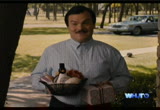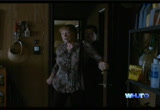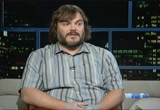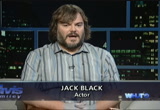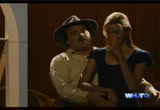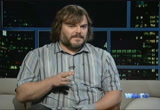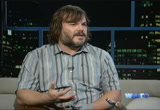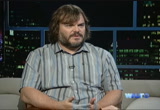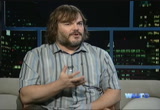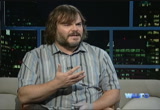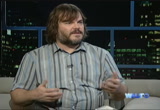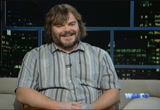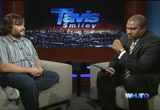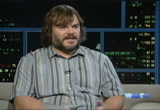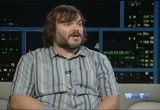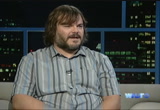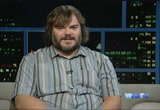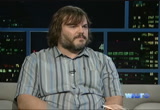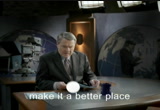tv Tavis Smiley WHUT November 2, 2012 7:00pm-7:30pm EDT
7:00 pm
musician jack black. he is the subject of serious awards talk this ball following his performance in the film "bernie". it is out now in dvd. a conversation with jack black, coming up right now. >> there is a saying that dr. king had that said there is always the right time to do the right thing. i try to live my life every day by doing the right thing. we know that we are only halfway to completely eliminating hunger and we have work to do. walmart committed $2 billion to fighting hunger in the u.s. as we work together, we can stamp hunger out. >> and by contributions to your pbs station from viewers like you. thank you.
7:01 pm
tavis: please welcome jack black to this program. he has received terrific reviews for his performance in his latest project, called "bernie". it is now available on dvd. here now are some scenes from "bernie". >> a real people person. just makes you feel real good about yourself. it is like the cast a spell on the entire area. >> room service. >> and she was just a mean old widow. >> she is to tear up my toys. she pulled ahead of my dolls.
7:02 pm
>> well, there is still some good in there. >> from the director of "school of rock" and "dazed and confused." >> they went to a acapulco, new york city, that when first class. but this spring, somewhere along the way, -- >> all i want is for you to be a man for one thing you are life. -- for once in your life. >> there are people in town that would have shot her for $5.
7:03 pm
>> the nicest fellow i ever met. >> he didn't do it. >> an angel of death. tavis: when i first saw this, i cannot believe this was actually based on a true story. >> yes, true story. tavis: where do you find the humor in a story where a guy kills his wife? >> it is not a traditional comedy, because it is based on a true story. there is a real murder here. that is a very serious subject, so you don't want to make a mockery of the situation. you want to play it real, but there are some very peculiar things about this particular case. he is the most popular guy in this small texas town. everybody loves him. he is the least likely to be a convicted murderer. not only does he murder, but he
7:04 pm
hides the body in an ice locker and just goes about his daily business as if nothing has happened, for nine months, before anyone even asks where is marjorie? she was the least popular person in town. she had a reputation for being super mean. so there is some comedy in there, as touchy a subject as it is. it took some social dancing around it though, because like i say, you don't want to come out and make a slapstick comedy out of our real event where real people's lives were affected. tavis: when you saw the script for this, what are your original box? >> my original thought was, i cannot wait to get back with my old pal, rick linklater, who
7:05 pm
directed "school of rock." i was real excited, but when i read it, very original, not like anything i had ever read before. for one thing, it mixes documentary style interviews with traditional storytelling. tavis: he met a lot of people really knew her, like the woman who said anybody in town would have shot her for $5. >> it is not just a bunch of actors. these are people from the small town of carthage, texas. rick really need the fabric of this story, because he is from east texas, too. he wanted to do a real authentic look at small-town texas gossip, like the people of the town. that really came through in the
7:06 pm
script. and also, another thought that went through my mind is this is something that is far away from me, very far from anything i've done in the past. the character is super effeminate and from texas and a mortician, all these elements i have never touched on before. he murdered someone. i have never played a part that had that kind of dark secret, and i have never murdered anyone. [laughter] that is one of the things that attracted me to it and also made me a little bit wary. tavis: did any of it intimidate you, or did you see it all as a challenge? >> my career has gone in a different direction. i am kung fu panda.
7:07 pm
you don't want kung fu panda to be suddenly murdering people. at the same time, it is good to mix it up and take a little rest now and then. because it is a gray area with this character and this project, he is likable but he also has this scary secrets, that created opportunities to go places as an actor that i had not done before. so in the end, i said i am going to try something new. tavis: i get the sense this small town of carthage, texas, is a character in this movie. so much of the flavor, i get the sense that the town is one of the characters as well. >> very much so. carthage, texas, the
7:08 pm
townspeople -- there is a sense of community there. i guess it is similar to all small towns. i grew up in l.a., so i don't have the background to know what is like to grow up in a small town like that, but there's a trust there. when there's someone who is beloved like bernie, everybody wants to give him the benefit of the doubt. the movie is very much about how a town can turn a blind eye to certain things if they love a certain person. they will really rally behind him. they really did. in a way, they did not want to believe that he was capable of such a thing, but even if he had done its, they wanted him to get away with it, and they wanted him back in the community because he was such a good person in every other way. he helped everyone out
7:09 pm
financially, and also just taking care to help the families of the deceased, because he is a mortician. after he would give people these beautiful. , he would go and follow up with the families to make sure they were ok, and you felt that love from the community around the time of the trial. they all rallied around him and devastated when he was convicted. tavis: i wondered if you had ever met the real burning. at the end, there is a little video of you talking to the real burning in prison. what was that experience like? >> it was a surreal experience. i had never been to a prison before, and i thought it was important. before started shooting, the director said we could go visit him, do you think we should? i was like yes, absolutely. not only could i pick up little hints about how to play him, and the way he walked and talked, my
7:10 pm
main question for him, that i knew the audience would be asking, is why did you not just leave? he became her manservant, in a way, because she was the richest lady in town, and she was jealous that all the old widows in town loved him so much, she wanted him all to herself. so she hired him as her assistant, but he basically did everything for her. they were also kind of best friends and traveled all over the world together and had great adventures in good times, but eventually the relationship soured and she became too controlling. he could not leave. that was my question, once it started to go silbert sour and you started having these feelings like i have to kill her, why is that not when it
7:11 pm
would go? it was very much the same as you get with these relationships -- you hear about them all the time, married couples where one of the murders the other one. the question as always, why did you not leave this abusive relationship? the answer is always the same, they fall into this trap. what do you call their relationship when is -- code dependency. i think that is where they work. they needed each other, in a away. this was his fatal flaw, it's that he had to be liked. he loved being loved by everyone in the community, including her. he knew if he left her, she would hate him and she would be hurt. this is how i think of him. he did not have release valve.
7:12 pm
some people when they get abused, they just bottle it up. they just turn the other cheek, and slowly the resentment builds and builds. it's such a gentle, delicate sold, that when it got to the breaking point, he just sort of exploded. it is a cautionary tale. tavis: it makes me wonder whether or not you took anything away from doing the movie and meeting him that maybe rethink whether or not, no matter how good we are, that each of us is capable of doing something. when you say he was so good hearted and everybody loved him, and he wanted to be loved, and i think that is why the town did not even consider that she was missing, and then when he was brought up on charges, nobody wanted to believe -- the d a had
7:13 pm
a hard time trying to convince people. the townspeople did not want to believe that bernie had done this. it seems like every other day on the news, somebody gets killed or does something crazy, and all the neighbors say, i cannot believe he did that. it is like you never really know anybody. what does this say to you about whether or not everyone of us has that dark side in the us? >> it just says to me -- that was the goal of the movie. when we started off, rick said i want to go on this journey, and when you get to the point where he murders her, that you would have at least some small understanding of how it was possible. all of us, before we snap to judge someone who has done a horrible crime, is it possible that all of us in the worst possible circumstances could be capable of something like that?
7:14 pm
it is about not judging people before really considering what the circumstance was. and that not all murders are created equal. we have a tendency in our society to just say murder? cut and dried, galway for ever. or maybe should have the electric chair yourself. but there are different shades of gray. it is not all cut and dried like that. for instance, was there premeditation? was there a plan to get away with it? was there a plan to get some kind of financial gain as a result of the murder? these are things that have to be carefully -- tavis: but he put her in the freezer, under the pot pies. >> it is gruesome, but at the same time, he was preserving the body.
7:15 pm
tavis: he said i had to preserve the body, i wanted to give her a nice burial. >> other people in the community all had theories on what he should have done to get away with it. all he had to do was put a pillow over her head and say she died of natural causes in her sleep, because she was so old. no one would have questioned and never not even have been an autopsy. she was so old, she was going to pass away soon, and he was the sole beneficiary of her fortune. he would have inherited it all. so is crazy for him to murder her and then try to get the money. all signs point to he was not premeditating this cold hearted murder. tavis: since by your own admission, this is such a departure from what we have seen you do at this point in your career, to what extent did this
7:16 pm
experience nudge you in the direction of doing other stuff, stretching out a bit more in terms of roles in the future? >> i am definitely open to it. i had a great experience. i don't really plan out what i am going to do in terms of what kind of roles. i love comedy and drama equally, and music, too. i just sort of follow my nose. whatever seemed really exciting at the time. but eventually i might want to do a rock opera. i have a couple of ideas. i have a band, tenacious d. we are always busy on the side, cooking up plans. we actually just cut a jazz album we are planning on releasing at the end of november. that is another change of pace.
7:17 pm
tavis: tenacious d does jazz. [laughter] >> nobody believes it, but rock is dead, and jazz is back, starting november 23. [laughter] tavis: how did you get into the music thing? you have been doing this for quite a while, obviously. >> i started with a love of musical theater when i was a kid. i was in high school productions. it has always gone hand in hand. i always say, i don't think of it have an acting career if it was not for music. i first big break was "high fidelity." i only got that one because i could pull off a musical number at the end. people like my band, tenacious d. it is all music and theater
7:18 pm
mixed together. there has to be music and acting. it seems to be my calling card. tavis: i think i read somewhere that when you walked in to see "bernie", the audience was yelling "nacho!" >> in a situation like that, you want some friends on the inside. tavis: i am curious as to your thoughts about this. i do these prime-time specials for pbs every so often, and i am working on one now. i did an education series last year called "too important to fail."
7:19 pm
i did a prime-time special last year. i am working on one now. this one is called "education under arrest." it is the -- about the criminalization of our kids in education, and where we would have been sent to the principal's office years ago, now you literally get a criminal record. you are standing in front of a judge for a fight in school, an argument with the teacher. the basic stuff that we used to get in trouble for and go to the office or go sit in study hall for a couple of hours, these kids are getting records, under this zero tolerance policy. i have been talking to a lot of kids in filming the special who are in alternative schools. the kids i have been talking to cannot cut it in the schools they are in, the traditional
7:20 pm
schools, or they want something different or court, in an alternative program. i read that at one point in your life, not because you were in trouble -- at one point in your life, there was a decision by made by your parents or somebody to put you in an alternative school. i want to be clear, not because you were in trouble, but you wanted to go to an alternative school. tell me a bit about that. i am just curious, i did not know anything about that until i started reading it. >> i was in trouble, but i elected to go to this school. i knew i needed to turn things around, and i needed a fresh start. i stole some money from my mom and i just felt so wracked with guilt and horrible about my situation. i don't remember how i heard about this school called
7:21 pm
poseidon. i wanted to go there. it was a small school for troubled youth. there was only about 30 kids on the campus. there is a therapist on the campus that would talk to the kids one on one, in between classes, and i went there for a year. it really helped me out, it turned my life around. there was also great. teacher there -- a great theater teacher there who turned me on to some great parts of myself. there is a program called 24 street theater with inner-city kids in l.a. it is something that is important to keep in mind. that is a great thing that you
7:22 pm
are working with the education system to help kids that are struggling. i could have ended up in a much different situation if i did not get some help buy some teachers that cared in a program like poseidon. tavis: thank you for answering that question. i was hoping what i had come across was true. it is fascinating and empowering for kids to see somebody who had some issues whenever young, who went to one of these alternative programs, but was able to get himself together. a lot of time these kids get in these programs and then reintegrate back into their old high school and graduate, but some of these kids just get lost and they never make it.
7:23 pm
anyway, i appreciate you answering that. i was fascinated when i came across that you had actually chosen to have that experience. there is oscar buzz in this town, in case you had not heard. i know actors are always a little leery of commenting on that, because nobody wants to jinx themselves, but it must feel good to know that your name is being bandied about. >> it is very embarrassing, but it does feel good to hear nice things about your performance. maybe we did something right. the way i can get around the embarrassment of people saying nice things is just thinking it is good for the production. all the people that worked on this thing, there are so many people, that i like it for them that we are getting some kudos.
7:24 pm
7:25 pm
>> for more information on today's show, visit tavis smiley at pbs.org. tavis: hi, i'm tavis smiley. join me next time for a look at the role of technology and health-care. that is next time. we will see you then. >> there is a saying that dr. king had that said there is always the right time to do the right thing. i try to live my life every day by doing the right thing. we know that we are only halfway to completely eliminating hunger and we have work to do. walmart committed $2 billion to fighting hunger in the u.s. as we work together, we can stamp hunger out. >> and by contributions to your pbs station from viewers like you. thank you.
7:29 pm
179 Views
IN COLLECTIONS
WHUT (Howard University Television) Television Archive
Television Archive  Television Archive News Search Service
Television Archive News Search Service 
Uploaded by TV Archive on

 Live Music Archive
Live Music Archive Librivox Free Audio
Librivox Free Audio Metropolitan Museum
Metropolitan Museum Cleveland Museum of Art
Cleveland Museum of Art Internet Arcade
Internet Arcade Console Living Room
Console Living Room Books to Borrow
Books to Borrow Open Library
Open Library TV News
TV News Understanding 9/11
Understanding 9/11

